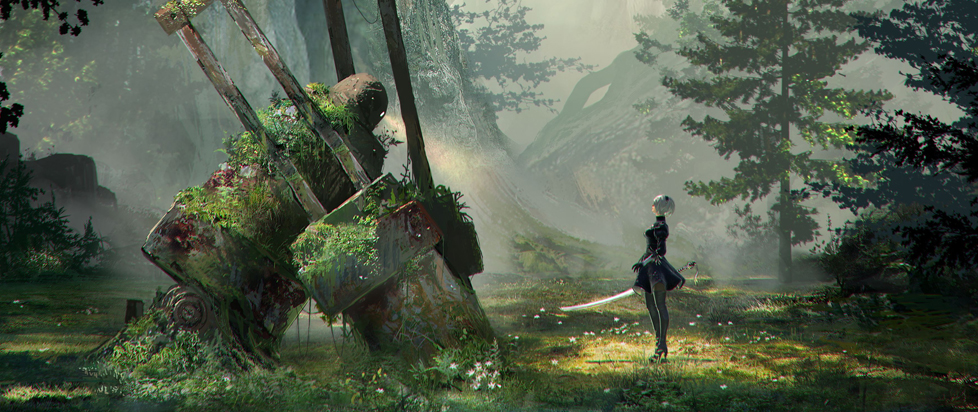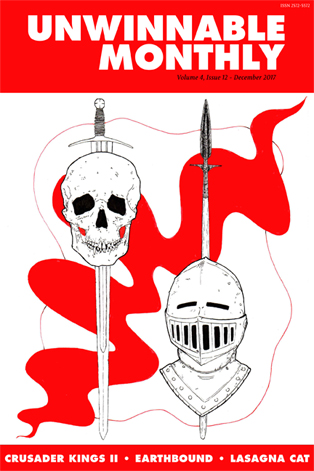
Saved State
 This column is a reprint from Unwinnable Monthly #98. If you like what you see, grab the magazine for less than ten dollars, or subscribe and get all future magazines for half price.
This column is a reprint from Unwinnable Monthly #98. If you like what you see, grab the magazine for less than ten dollars, or subscribe and get all future magazines for half price.
———
Corey Milne stands at the intersection of gaming and world history to see what he can see.
———
There are no checkpoints in Nier: Automata. Okay, well I’ve already told a bit of a lie in my first sentence. The game does occasionally do the odd autosave after particular story beats. Within the moment to moment events in the game, Nier doesn’t safeguard the player’s progress. No, the player must choose when and where to save, first by activating the required equipment within the world. This can be offputting for players who dislike the busywork of having to bring up menus and navigating save slots. It can feel like a hurdle thrown in to disrupt the flow of the experience. Considering the themes being explored in Nier: Automata about personhood and identity, this is an important design decision.
From the very beginning the game makes its intentions clear and I do mean from the very beginning. During what we can label as the tutorial section which spans the first 20 to 30 minutes of the game, players cannot save their progress. Fail during the sections’ climactic boss battle (as I did), you’ll be booted back to the very beginning to retrace your steps. This serves several purposes. It accentuates the isolation your android avatar 2B is feeling while they fight their way through enemy territory. You had been part of a squadron which was blown out of the sky one by one on their approach to the oil rig that serves as the game’s first area. Other than the game’s other protagonist 9S working recon from the sidelines, you’re utterly alone. It makes sense too. Why would the enemy contain the necessary equipment and digital networks that would give you an advantage over them?
It’s indicative of Automata’s sense of humour. Much like the original game, Automata will play with genre conventions. In what is traditionally supposed to be the easiest section of a game, player’s are forced to run a gauntlet before they’ve acquired any new weapons or upgrades. More importantly your save isn’t commodified to the point of neglect. While there are no points after the opening section where the player will go so long without a save, the player will now be acutely aware of it.
This becomes embedded within the narrative. With each death 2B or any of the other characters will emerge from the save point in a brand new body, their records stored up until that point and ready to continue. Through the many twists and turns of the narrative we find out that 2B’s model was designed to execute the 9S model when they eventually, inevitably, figure out the ultimate fate of the world. We don’t know how many times the boy has been wiped and rebooted. We only know that for our pair of android heroes “it always ends like this.”
With its existential heart Nier: Automata tries to explore how cycles of abuse, violence and bigotry are perpetuated. What this does to the individuals trapped within? They’re trapped within a system that has already determined their fates. How does this warp their identity? We as players are complicit in this. We control their actions. We load up our games and save when we feel they’ve made sufficient progress.
By the time the end credits roll on the final “true” ending we’re confronted with the choice. The one that, looking back feels inescapable. It’s a familiar setup to those who played through the first Nier, but it retains its weight. It’s exciting and melancholy. The credit roll is just another part of the stage on which we act. Instead of renewing the cycle anew by choosing to engage in a new game, one must sacrifice their very self. You devote your save data, the accumulation of you experiences, to another player. So that they can continue on their journey and in doing so remove yourself from the system. In a game that is rooted in antagonism and in which all of your actions have been steeped in violence, cooperation is a radical act. Then a bullet strikes your blip. In an instant, the data you’ve cared for and updated meticulously is gone and you turn the game off.
It always had to end like this.
———
Corey Milne is an Irish freelance writer who likes to poke at that strange intersection where games meet history. A roundup of his writing can be found at coreymilne.com. You can join his Rad-Lands motorcycle bandit gang on Twitter @Corey_Milne.




